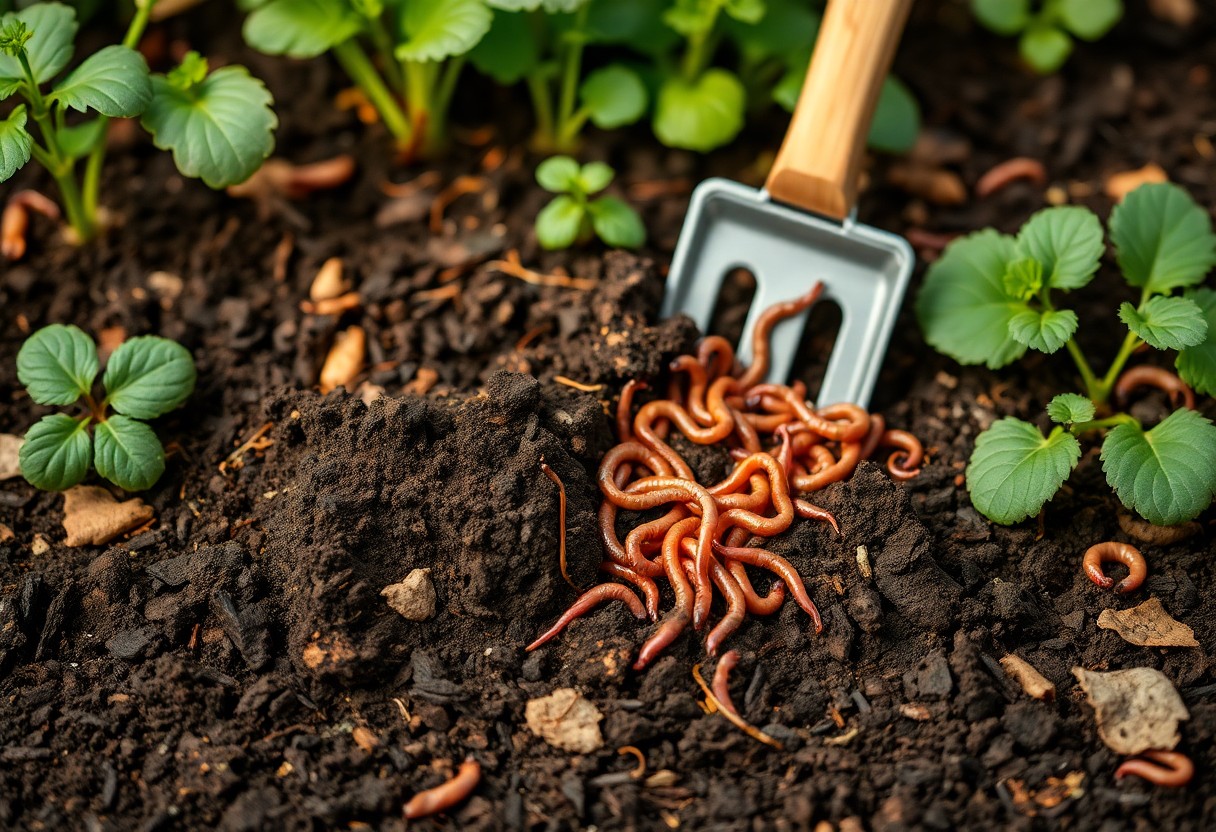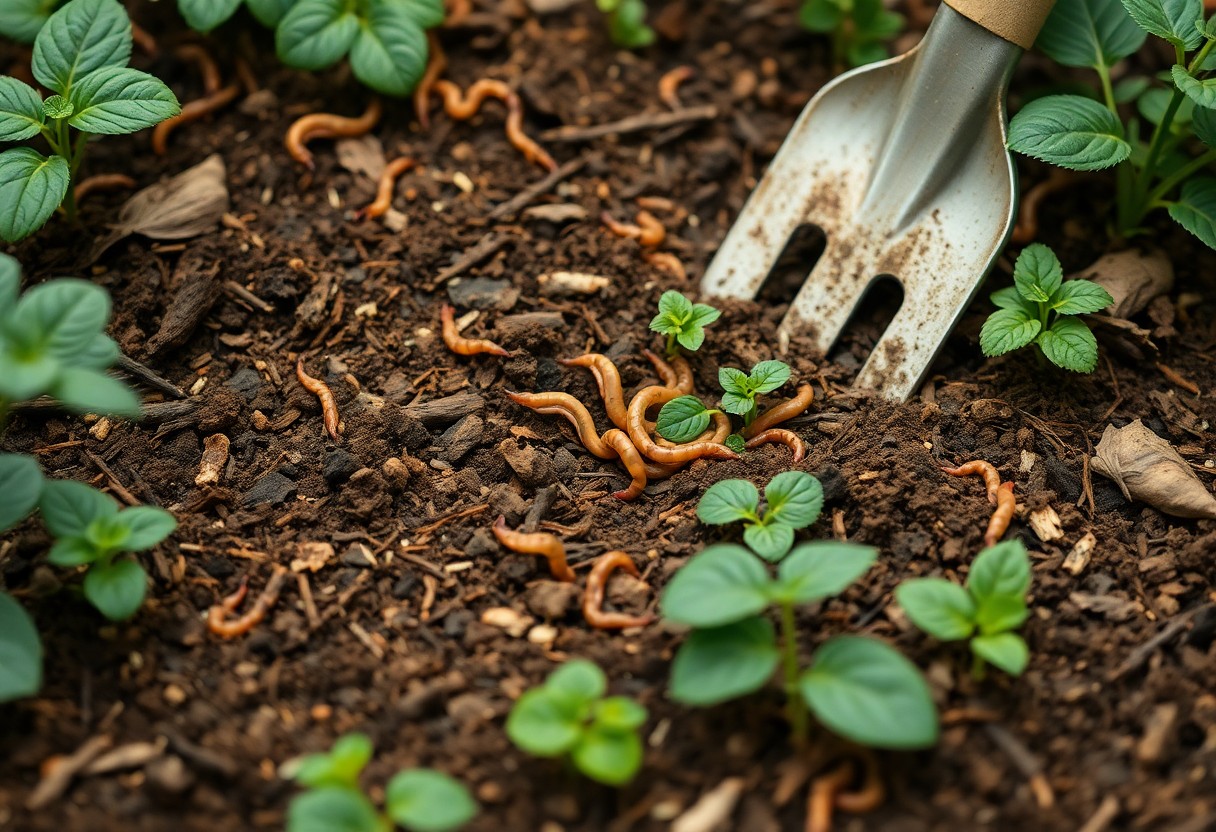Just the right amendments can keep your garden soil healthy and well-aerated. Soil compaction occurs when particles are compressed, leading to poor drainage and stunted plant growth. To combat this, you should consider adding organic matter, such as compost or well-rotted manure, which enhances soil structure while improving nutrient availability. Additionally, incorporating mulch can protect the soil surface, reducing erosion and moisture loss. By enriching your soil this way, you’ll create an ideal environment for thriving plants.
Key Takeaways:
- Incorporate organic matter such as compost, peat moss, or leaf mold to enhance soil texture and promote aeration.
- Utilize cover crops, like clover or rye, during off-seasons to improve soil structure while preventing erosion and compaction.
- Practice mulching with materials like wood chips or straw to protect the soil surface and maintain moisture, reducing hardening from foot traffic or heavy rain.

Understanding Soil Compaction
Before you can prevent soil compaction, it’s crucial to understand what it is. Soil compaction occurs when soil particles are pressed together, reducing air space and making it denser. This process can lead to challenges in water infiltration and root growth, ultimately hindering the health of your garden. Identifying the signs and causes of compaction allows you to take proactive measures to maintain optimal soil structure for your plants.
Causes of Soil Compaction
Behind soil compaction are several contributing factors, including heavy foot traffic, machinery movement, and rainfall on saturated soil. When you walk or drive on moist ground, the weight compresses the soil particles, squeezing out air and making it less fertile. Additionally, soil texture and composition can make some soils more susceptible to compaction than others.
Effects on Plant Growth
About the effects of soil compaction, your plants may suffer significantly due to limited root expansion and restricted access to crucial nutrients. Compacted soil can create a barrier that prevents roots from penetrating deep enough to access moisture, leading to stress and reduced vitality for your garden’s greenery. Furthermore, compacted soil can lead to poor drainage, causing waterlogging and ultimately harming your plants.
For instance, when soil is compacted, roots struggle to establish themselves, and they may become shallow or fail to anchor firmly into the ground. This can lead to stunted growth and a weakened plant structure. In addition, nutrient uptake may be severely hindered, making your plants more susceptible to disease and pests. By taking action against soil compaction, you’re ensuring a vibrant garden that thrives instead of fades.
Organic Matter Amendments
Now, adding organic matter amendments to your garden soil is necessary for preventing compaction and improving overall soil health. These amendments enhance soil structure, making it easier for roots to grow while also increasing water retention and aeration. Utilizing organic matter not only promotes beneficial microbial activity but also boosts nutrient availability for your plants. By incorporating these amendments, you’ll ensure that your garden flourishes, creating a vibrant and productive growing environment.
Compost
Across the gardening community, compost is recognized as one of the best organic matter amendments you can add to your soil. This nutrient-rich material is made from decomposed organic matter, including kitchen scraps and yard waste. Adding compost to your soil not only enriches it, but also helps to improve drainage and prevents compaction, allowing your plants to thrive.
Well-Rotted Manure
By incorporating well-rotted manure into your garden soil, you introduce an excellent source of nutrients while significantly enhancing soil structure. This amendment works wonders by breaking up compacted soil, facilitating root growth, and improving water retention.
In fact, well-rotted manure adds necessary nitrogen, phosphorus, and potassium to your soil, promoting vigorous plant growth. However, it’s important to use well-aged manure to avoid introducing harmful pathogens and weeds. The aging process ensures that the manure is composted adequately, reducing the risk of burning your plants due to excess nitrogen. When applying well-rotted manure, do so in moderation to maximize benefits while maintaining a balanced nutrient content in your garden soil.
Mineral Amendments
To improve soil structure and prevent compaction, you can incorporate mineral amendments, which help enhance drainage and aeration. These amendments can introduce crucial minerals that boost soil fertility while also breaking down dense soil particles. By adding the right minerals, you can create a healthier environment for your plants, enabling them to thrive by improving root development and nutrient absorption.
Gypsum
Below, gypsum serves as an effective soil amendment that helps alleviate compaction problems, especially in clay-rich soils. It works by loosening compacted soil particles, allowing for better water infiltration and root penetration. Additionally, gypsum can improve soil structure and reduce salinity, promoting a healthier growth environment for your plants.
Sand
Sand can be a great additive for enhancing soil texture and combating compaction. It works by creating larger pores in the soil, improving aeration and drainage. This is particularly beneficial in heavy clay soils where water tends to pool, as it encourages healthier root systems and reduces the risk of waterlogging.
The key is to use the right type of coarse sand, as fine sand can lead to further compaction. Aim for a mix of approximately one part sand to two parts organic matter for optimal results. This combination not only helps improve drainage but also promotes beneficial microbial activity in your soil, resulting in a thriving garden ecosystem.
Soil Aeration Techniques
Keep your garden soil healthy and free of compaction by implementing various aeration techniques. Effective aeration enhances water infiltration, root growth, and nutrient absorption. Whether you use tools or manual methods, disrupting the soil structure helps to alleviate compaction, providing your plants with the ideal growing conditions.
Aeration Tools
Between different aeration tools available, the most common options include core aerators and spike aerators. Core aerators remove small plugs of soil, allowing air, water, and nutrients to reach plant roots more effectively. Spike aerators, on the other hand, simply create holes in the soil, which can also be beneficial but may not provide as much relief.
Manual Aeration Methods
By incorporating manual aeration methods, you can effectively loosen compacted soil. Tools like a garden fork or aeration sandals can allow you to aerate your soil without relying on machinery. Simply insert the fork into the ground and lift it slightly to create space for air and moisture to penetrate.
But while manual aeration is effective, you should take care with deep compacted areas where heavy traffic occurs, as it can lead to back strain or injury. Employing proper techniques can mitigate risks; for example, consider working in smaller sections and utilizing leverage when using tools, ensuring you maintain good posture. Additionally, aeration is most beneficial when performed during optimal weather conditions, such as when the soil is slightly moist yet not overly wet. This technique significantly enhances your soil’s structure, promoting healthier plants.

Seasonal Practices for Soil Health
Not only does taking seasonal practices into account enhance the health of your soil, but it also significantly reduces compaction. By integrating methods such as cover crops and mulching during specific times of the year, you can ensure a robust soil ecosystem that supports plant growth and resilience against environmental stressors.
Cover Crops
Crops like clover, rye, and vetch are excellent choices to include in your garden during the off-seasons. These plants improve soil structure, increase organic matter, and help to prevent erosion while fostering a thriving microbial community.
Mulching
Against soil compaction, applying a layer of mulch can be incredibly effective. Mulching not only retains moisture but also protects the soil from temperature fluctuations and prevents weed growth.
Also, mulching adds nutrients back into your soil as it decomposes, promoting a vital ecosystem of beneficial organisms. It creates a barrier against heavy rain and potential runoff, which can cause soil particles to compact. Choosing organic materials, like straw or wood chips, ensures that your mulch is environmentally friendly and actively enhances soil structure, leading to improved drainage and aeration.
Long-Term Strategies for Soil Structure
Many gardeners overlook the importance of maintaining soil structure for long-term garden health. To prevent soil compaction, consider implementing strategies such as enhancing organic matter, practicing crop rotation, and embracing no-till gardening. These methods not only improve aeration but also enrich nutrient content, fostering a thriving garden ecosystem that benefits your plants over time.
Crop Rotation
Beside enhancing soil health, crop rotation is necessary for preventing nutrient depletion. By alternating the types of crops you grow each season, you can minimize pest buildup and improve soil structure, which in turn leads to better moisture retention and aeration for your plants.
No-Till Gardening
Long-term, no-till gardening is a sustainable approach that maintains the integrity of your soil structure. By minimizing soil disturbance, you can support the natural habitat of beneficial organisms while reducing erosion. This method enhances the ability of your soil to retain moisture and nutrients, facilitating healthier plant growth.
Hence, adopting a no-till gardening approach allows you to build a resilient soil ecosystem over time. This technique not only preserves the natural layers and structure of the soil but also encourages the proliferation of microorganisms that are vital for nutrient cycling. By avoiding mechanical soil disruption, you can strengthen your soil’s ability to withstand environmental challenges, ensuring that it remains nutrient-rich and well-aerated for your plants.
Summing up
Ultimately, to prevent soil compaction in your garden, you should add organic matter such as compost, well-rotted manure, or mulched leaves. Incorporating materials like sand or perlite can enhance aeration, while deep-rooted cover crops can improve soil structure over time. Regularly aerating your soil and practicing crop rotation will also support healthier, less compacted soil. By following these steps, you’ll create a thriving garden environment that allows your plants to grow robustly.
FAQ
Q: What materials can I add to my garden soil to help prevent compaction?
A: To prevent soil compaction, consider incorporating organic materials such as compost, coarse sand, and peat moss. These materials improve soil structure, enhance aeration, and encourage beneficial microbial activity, which collectively help to reduce compaction.
Q: How does adding compost to soil prevent compaction?
A: Compost improves soil structure by creating a crumbly texture that promotes better aeration and water infiltration. Its organic matter increases the soil’s ability to hold moisture and nutrients, reducing tightness that can lead to compaction.
Q: Is there a specific ratio for mixing amendments into my garden soil to combat compaction?
A: A common recommendation is to mix about 25-30% organic amendments like compost or peat moss into your existing soil. This can vary based on your soil type, so it’s wise to start with moderate amounts and adjust based on how your soil responds over time.
Q: Should I add mulch to my garden to help prevent soil compaction?
A: Yes, adding mulch can be beneficial. Organic mulch materials such as wood chips, straw, or shredded leaves help prevent surface compaction by reducing the impact of rain and foot traffic, while also maintaining soil moisture and temperature.
Q: How often should I add amendments to my garden soil to maintain its structure?
A: It is advisable to add organic matter, like compost or mulch, at least once a year, preferably in the spring or fall. Regularly refreshing your soil amendments helps to maintain soil structure, fertility, and overall garden health over time.
